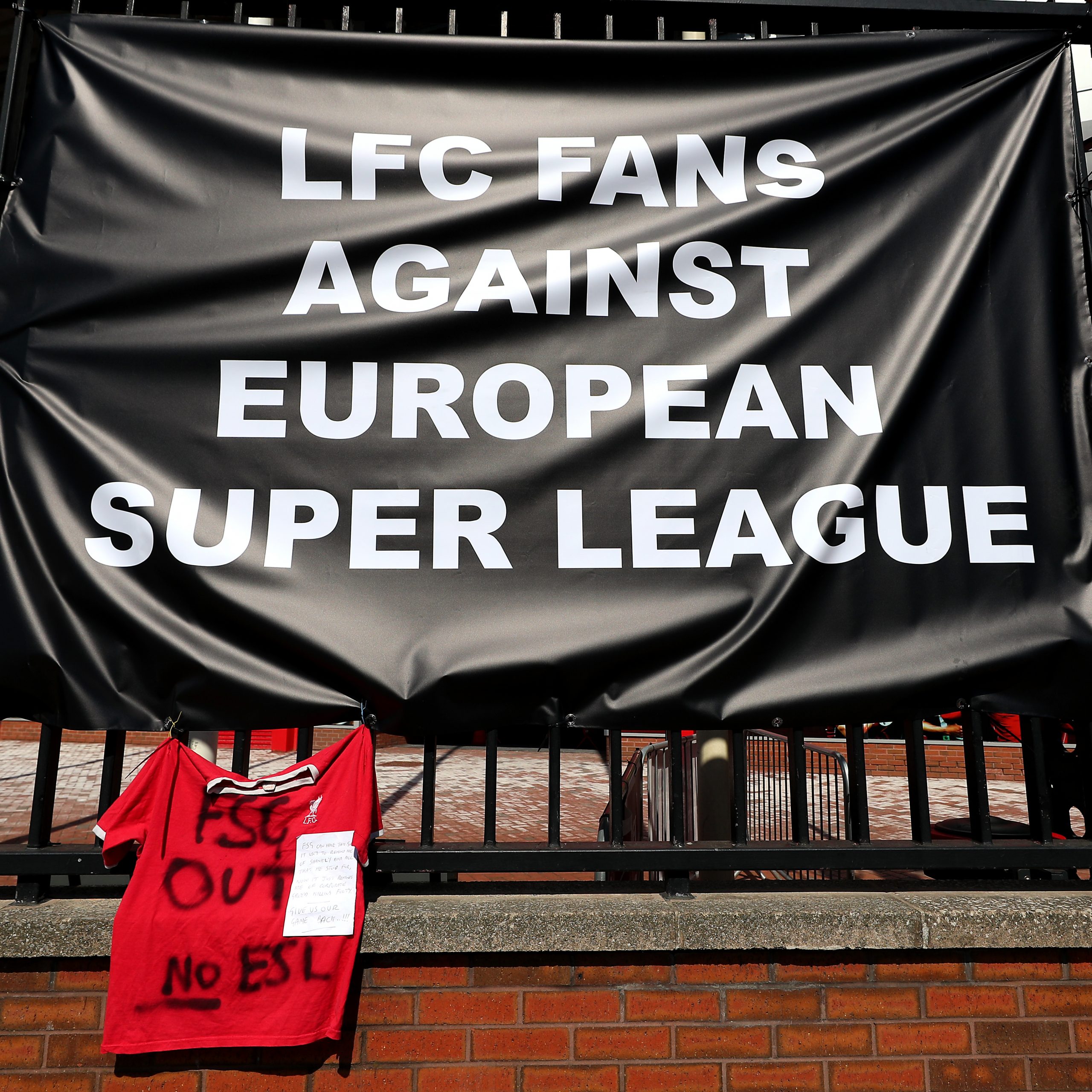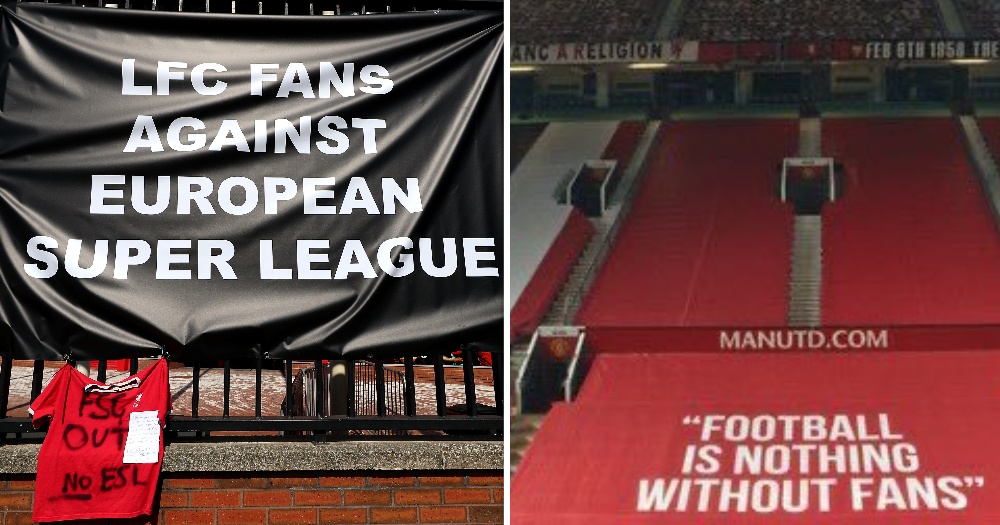Follow us on Telegram for the latest updates: https://t.me/mothershipsg
You might have noticed your football-watching friends share some articles and thoughts on a recently formed European Super League.
Non-football fans might be forgiven for thinking something absolutely monumental had happened right under their noses, but have no idea what exactly.
Here is a quick summary of what went down.
11 of the most vaunted names in European football history, and Tottenham, have formed this breakaway super league.
More are expected to join, and make this a 20 team, two group super league.
Here are the current 12: Arsenal, Barcelona, Manchester City, Manchester United, Real Madrid, Juventus, Inter Milan, AC Milan, Liverpool, Atletico Madrid, Chelsea, and Tottenham.
We will be focusing more on the six English clubs for this piece.
Why does it matter?
Questions of elitism, merit, exclusivity, money, and even more money are just some questions that have been thrown around today.
Money
It is still an incomplete league, with a lot of questions to be answered. But here's something that is probably definitely going to happen. The teams are going to make a lot of money.
They are going to make so much money, like an absurd amount.
Marca, a Spanish paper, placed the figure at about three times the amount they are getting from UEFA, so about 400 million euros (S$640 million) for the winner. These are of course just rough figures, as nothing concrete has been made public.
A report on Sky Sports revealed insider info from an anonymous board member in one of the six English Premier League clubs.
Some of the points the member raised included how determined the owners of the club were to pursue this, and how one owner was even willing to be dropped from their domestic league, because the money in the new league would be just too good.
The money will most likely come from exclusive broadcast rights to the league.
Two countries that Sky mentioned were The United States, and Saudi Arabia.
The Guardian also reported that JP Morgan is committing billions to getting the super league off the ground.
Exclusivity
It is a very odd structure that is being proposed for this new league.
Among the 12 confirmed teams, there are currently six teams from the EPL, and three teams apiece from the Serie A (Italy) and the La Liga (Spain).
It is unclear how exactly these clubs were chosen, since teams like Leicester, who won the EPL in 2016, Napoli and Roma who have secured more top 3 finishes in Serie A over the last five years than either Milan team, or Sevilla, who are by far the most successful club in the Europa Cup (beating out Inter in the finals last year), would all have arguably stronger arguments based on recent accomplishments.
The 12 aforementioned clubs, and three more unannounced teams, will also not face relegation from this Super League. Which basically means a recurring annual cash stream for these six clubs.
So this means hundreds of millions in annual revenue for the super league clubs that the vast, vast majority of other teams will not have access to.
Which is way more consistent a revenue stream than having to take the trouble of ensuring their teams are good enough to qualify for the Champions League on merit (only four spots from the domestic league).
Competition
In the report by Sky, a very pertinent point of contention was raised. What about competition?
If one of these 12 super clubs were playing against another of these 12 (soon to be 20) super clubs, they would most likely field their strongest unit.
But what happens when the next game, a domestic league match against a non-super club team, arrives a few days later?
Chances are, the same elite players might be given a much needed break.
Which might be a bit of a downer for non-elite super team fans looking to catch some star power.
This is not even mentioning what this could do to their individual domestic leagues.
Football 365 cited UK Culture Secretary Oliver Dowden on the proposals:
“We have a football pyramid where funds from the globally successful Premier League flow down the leagues and into local communities. I would be bitterly disappointed to see any action that destroys that.”
Competitions like the Champions League, which is famed for featuring the best teams in Europe, might very well suffer from the lack of marquee clubs in the running.
A preview perhaps:
https://twitter.com/Djib91_/status/1384101788807098372
There are still some juggernauts left though, (PSG, Dortmund, Bayern Munich) but we will get back to them in a bit.
Punishments
Many have called for points docking, and even kicking teams out of leagues for their actions.
Here's Spanish side Real Betis drawing up a new league table after taking out the three La Liga teams who have agreed to join the ESL.
Real Betis appear to have deleted the breakaway Spanish clubs from the league table on their club website 👀
— ESPN FC (@ESPNFC) April 19, 2021
Even though it meant rivals Sevilla would be sat in 1st place 😳 pic.twitter.com/Xqz9zWPf78
Things will be clearer over the next few weeks, but as of now there seems to be immense bad blood from the teams left behind.
According to Sky Sports, some of the 14 Premier League clubs have even called for suspension of the six teams.
To their credit, the owners of the secession six seems to have anticipated this backlash. In fact, as the unnamed board member told Sky when asked if there was a civil war in football:
"This is not a civil war, it's a nuclear war."
Who owns the club?
All these very complex and long-drawn arguments and potential lawsuits ultimately still boil down to one thing for many fans.
Something that Gary Neville touched on during his impassioned rant against the six clubs, including his own Manchester United, was a part about the owners. Here's an excerpt, via Football 365:
“Forget [the owners]. They have nothing to do with this football club. They’re just custodians. The fans that come into this ground that supported this club for 100 years are the people that matter and we want competition and the ethos of the club.
Now some might say that’s gone already, but forget [the owners] – they have nothing to do with this football club, in terms of the actual history of the club and the long-term future, they’ll be gone. They’re just passengers in the night, as far as I’m concerned."
A common refrain brought up by fans opposed to the move has been this:
Football
— Barça Worldwide (@BarcaWorldwide) April 19, 2021
/ˈfʊtbɔːl/
noun
• A sport created by the poor and stolen by the rich. pic.twitter.com/sJ3thvrvAa
Manchester United fans have also pointed to this quote at the stadium, attributed to legendary manager Sir Matt Busby:
Our owners need to practise what Sir Matt Busby preached. pic.twitter.com/zK1XaQSWOZ
— Alexei (@MUFC_redarmy99) April 18, 2021
Liverpool fans have made their intentions quite clear:
 Banners are placed outside of Anfield, home of Liverpool FC to protest against its decision to be included amongst the clubs attempting to form a new European Super League. Picture date: Monday April 19, 2021. (Photo by Peter Byrne/PA Images via Getty Images)
Banners are placed outside of Anfield, home of Liverpool FC to protest against its decision to be included amongst the clubs attempting to form a new European Super League. Picture date: Monday April 19, 2021. (Photo by Peter Byrne/PA Images via Getty Images)
So quite a lot of the fans are against it, and the owners are going ahead with it.
A weird dynamic to say the least.
German teams
So let's take a quick look back at two prominent teams that didn't join the ESL.
Bayern and Dortmund, both from the Bundesliga (German league).
Some have highlighted the importance of the 50+1 rule, which, according to DW, basically ensures majority member (or fan) ownership.
"This is a big one. The vast majority of Germany's professional clubs, including Bayern and Dortmund, are governed by the 50+1 rule, which essentially enshrines majority member (or fan) ownership.
This is designed to prevent private investors taking outright control of a club in the way seen in the Premier League."
Relegation
An interesting, and perhaps commonly-known, tidbit during the Sky Sports report was that the driving forces behind the breakaway are Manchester United co-owners "Malcolm and Joel Glazer, and United executive vice-chairman Ed Woodward, with backing from American investment bank JP Morgan".
Chelsea and Man City apparently had major reservations, but decided they could not be left behind in the weakened EPL.
A point bought up constantly has been how some owners of the top six clubs are unable to get their head around the concept of relegation.
Why bother with relegation for clubs of their stature, they might be forgiven for thinking.
Which, apart from the heaps and heaps of money the league will generate, might be a crucial point in understanding why this is even taking place.
It might be absolute coincidence, but the two teams that were majorly apprehensive about the whole thing were the two teams that had most recently suffered relegation.
Chelsea had been relegated back in 1988, while Manchester City suffered the drop as recently as 2001.
That acknowledgement of history, and the understanding that their current lofty place in football was by no means a given, might render the idea of an un-relegatable super league a tad more absurd and laughable.
Image from Getty
If you like what you read, follow us on Facebook, Instagram, Twitter and Telegram to get the latest updates.
